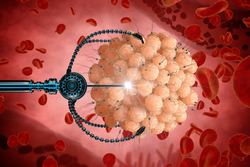Portugal’s nanomedicine infrastructure gets a boost
The University of Minho is situated in Northern Portugal in one of the most industrialised regions. Within the Materials Science and Engineering department, the Biomaterials, Biodegradables and Biomimetics Research Group (3Bs) is renowned for its excellence and innovative approaches in the field of macro and microscale processing of biomaterials. Its research activities mainly focus on regenerative medicine technologies, including biomaterials, stem cells and tissue engineering. However, advancement in the medical field for diagnosis and treatment heavily rely on the nanostructuring of biomaterials, necessitating the development of novel technologies. For this purpose, the EU-funded POLARIS(opens in new window) (Unlocking the research potential of 3Bs Group, University of Minho, in nanomedicine field to strengthen its competitive position at the European level) project worked to strengthen and boost the research potential of 3Bs in the field of nanomedicine. The initiative entailed the recruitment of experienced researchers and technical staff in the field of nanomedicine and was attained by leading European institutions (Chalmers University of Technology, Max Planck Institute for Intelligent Systems, University College Dublin and University of Strathclyde Glasgow). Project objectives included enhancing the research capacity of 3Bs in self-assembling methodologies, biofunctionalisation of nanoparticles and surface characterisation and nanofabrication tools. For this purpose, a set of instruments were obtained (AFM, lithographic equipment, electrokinetic analyser) for the processing and characterisation of nanostructured biomaterials and nanobiomaterials. Considerable effort went into supporting the scientific output of the 3Bs with workshops and training courses. These enhanced the knowledge of the group on the nanotech manipulation of materials and their interaction with cells. Furthermore, POLARIS strengthened the IP protection and innovation standards of 3Bs to achieve successful funding and become more competitive at the European level. POLARIS activities led to an exponential increase in the provision of services to other academic and industrial institutions. At the same time, the quality of the research improved as evidenced by publications in journals with higher impact factor, and the group attracted significantly more funding.







